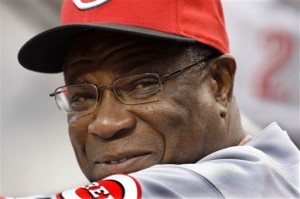 In Sunday afternoon’s game between the Chicago Cubs and Cincinnati Reds, Reds starter Johnny Cueto threw a pitch over the head of Cubs second baseman David DeJesus in the sixth inning. A warning was issued to both clubs, as tension had already commenced beginning in the fourth inning when Cubs starter Matt Garza hit Todd Frazier with a pitch.
In Sunday afternoon’s game between the Chicago Cubs and Cincinnati Reds, Reds starter Johnny Cueto threw a pitch over the head of Cubs second baseman David DeJesus in the sixth inning. A warning was issued to both clubs, as tension had already commenced beginning in the fourth inning when Cubs starter Matt Garza hit Todd Frazier with a pitch.
Following the game, a 5-4 victory for the Cubs in ten innings, Matt Garza expressed his disgust for Cueto’s retaliation in the sixth inning, telling clubhouse reporters: “Hopefully he learns to grow the hell up. Cueto should learn you don’t go after guys’ heads. Don’t wake a sleeping dog and I think that’s kind of immature on his part and totally uncalled for.” Garza would go on to say that he saw total disrespect in the errant pitch by Cueto, defending his friend and teammate David DeJesus.
Cincinnati Reds manager Dusty Baker would respond with remarks of his own, telling MLB.com’s Mark Sheldon: “You got something to say, you go over there and tell him. Johnny ain’t running. Know what I mean? A guy can say what he wants to say, but it’s better if you go over and say it to his face. I just wish, just put them in a room, let them box and let it be over with, know what I mean?”
Cueto, having been suspended in 2010 for kicking former St. Louis Cardinals catcher Jason LaRue in the head during a bench-clearing brawl (an action that would leave LaRue with a serious concussion, forcing LaRue into an early retirement), should be more cognizant of the location of his retaliatory pitches, as throwing anywhere in the vicinity of a batter’s head is highly risky and looked down upon with great indignation by opposing clubs and fan (provided his pitch to DeJesus was in fact retaliatory).
As for Garza, making such heated comments only brings negative attention to yourself and your team. Although Garza felt that he was protecting his teammates with his comments, those heated comments will be treated as and remain exactly what they are, heated comments. As the old adage goes, actions speak louder than words. Unfortunately, more and more players continue to take it upon themselves to speak first and act (if they even act) later.
Dusty Baker’s comments follow the same transgression from that adage. Baker had the opportunity to serve as the clubhouse leader and organization ambassador by taking the “high road” in the wake of Garza’s comments; however, Baker added fuel to the fire by publicly advocating for altercations to be settled by means of “fisticuffs,” a rather brash comment at that.
As previously stated, actions speak louder than words. If discontent or tensions arise, settle the score in a professional and admirable manner on the field. Baker, Cueto, and Garza, as well as many other big league players, may wish to follow through with such proactive sentiment and contribute further in preserving and promoting the integrity of the game.
